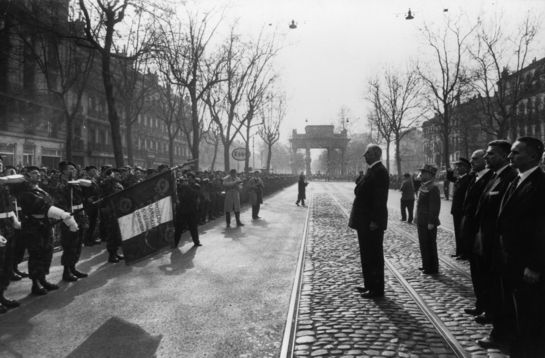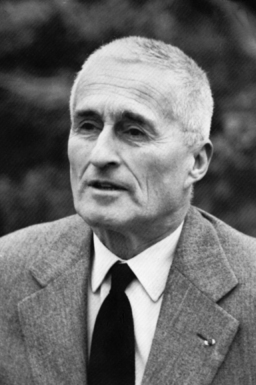The Cost of Courage (26 page)
Read The Cost of Courage Online
Authors: Charles Kaiser

With $160,000 — raised, ironically, in Germany and Switzerland — Ophuls became the director of the documentary, and he started filming in Clermont-Ferrand, the capital of the Auvergne province in the center of France, 242 miles from Paris. He chose Clermont-Ferrand partly because of its proximity to Vichy, the capital of the unoccupied zone during the war. The region was also the birthplace of the Maquis, the guerrilla army of the Resistance that fought in the countryside.
Ophuls thought de Gaulle’s myth of an almost-universally resistant France had contaminated everyone who had lived through the war. “There’s something unhealthy about asking all these millions of individuals to lie to each other, to lie to themselves,” he told me. “I don’t think this can possibly be good politics — now or then.”
‡
So he set out to correct the record.
The result was one of the greatest documentaries of the twentieth century. After it was — predictably — banned from French television,
The Sorrow and the Pity
became a huge hit with the younger generation at the movie theaters on the Left Bank in the spring of 1971. Its honesty fit the revolutionary spirit of the ’60s. The film featured interviews with everyone from the local butcher of Clermont-Ferrand to a Paris aristocrat who had served with the French division of the Waffen SS, as well as two former prime ministers of France and Great Britain: Pierre Mendès-France and Sir Anthony Eden.
The two-part, four-hour film filled a twenty-six-year vacuum of information with a brutal portrait of the stark divisions inside wartime France. Recalling a split reminiscent of the one in the Boulloche family, teachers from the lycée in Clermont-Ferrand described how their students were more active in the Resistance than their instructors, because “young people are generally much more sincere, and … more alive.” It also included a searing section on the decision of the French gendarmerie to arrest 4,051 Jewish children in Paris in the summer of 1942 — even though the Germans had never asked them to arrest anyone younger than sixteen. After four days of indecision, all the children were shipped off to Germany — and every one of them was gassed as soon as they arrived at the camps.
All of the Boulloche children of my generation saw
The Sorrow and the Pity,
and we all agreed it was an important event.
§
A year later, the debate about France’s wartime behavior intensified with the publication of
Vichy France
by Robert O. Paxton, a young American historian who used German archives to document the extent of French collaboration during the war. Most of the Boulloches also read Paxton’s book. But neither the film nor the book lifted the veil shrouding the family’s wartime experiences.
IN THE LATE 1950
s
AND EARLY
’
60
s, André, Christiane, her husband, Jean Audibert, and Jacqueline all embraced France’s most progressive cause, by joining the Club Jean Moulin to battle the OAS (Organisation de l’armée secrète), a paramilitary terrorist group that used bombings and assassinations to try to prevent France from allowing Algeria to become independent.

Christiane around 1960, just before I met her for the first time in Paris.(
photo credit 1.24
)
France’s withdrawal from its North African colony was a long, bloody process for Algeria and France alike. Once de Gaulle became convinced that it was necessary to leave Algeria, he was the main enemy of the OAS. After an OAS uprising failed in Algiers in April 1961, the organization turned to terror on both sides of the Mediterranean, including several unsuccessful attempts to murder de Gaulle.
André shared the widespread view that the Algerian quagmire posed a serious threat to French democracy. He decided very quickly that de Gaulle was the only politician powerful enough to bring about France’s exit and prevent the return of a right-wing dictatorship in France. Indeed, that was the main reason he and his sisters supported de Gaulle’s return to power at the head of a new Fifth Republic in 1958. After that, André lobbied the general to leave Algeria whenever he saw him.
André said the war in Algeria was “eating the national tissue away like an acid. Civilians are scared of the military, and the military doesn’t trust the government.”
Meanwhile, Christiane remained as fearless as ever. She had become the treasurer of the Association for the Defense of Djamila Boupacha. The young Algerian woman was a famous and beautiful member of the FLN (Front de libération nationale algérien) who was tortured by the French into confessing terrorist activities. She was only twenty-three when she was condemned to death on June 28, 1961. Part of Christiane probably identified with the undaunted young activist.
“It was a period when there were terrorist attacks in Paris,” Christiane told me. “The OAS was carrying out terrorist attacks. And when I was the treasurer of the association, my name and address was on our literature. Which was a risk — there’s no question about that. When they were still very small, I tried to make [my] children understand that if they saw a suspicious package, they had to tell me right away. They thought this was very exciting! They didn’t realize that it was also very dangerous.”
Fortunately, Christiane’s apartment was never blown up, and she celebrated when Boupacha was granted amnesty, after France signed the Évian Accords, which gave Algeria independence, in Évian-les-Bains, on March 18, 1962. Boupacha was freed one month later — the same month that 90 percent of France voted to approve the accords in a referendum.
Jacqueline, who had worked for her brother when he was a minister, later became secretary-general of the UNESCO Clubs, which gave her a forum to lobby for the interests of the developing nations of Africa, Asia, and South America.
In the 1960s, Christiane turned her attention to women’s issues. Since 1920, French law had banned abortion and all information about contraception. Under the banner of
“Si je veux, quand je veux”
(If I want, when I want), Christiane campaigned for the legalization of both. In 1967, the Neuwirth Act finally legalized the sale of contraceptive devices, but abortion wasn’t legalized until 1975, and advertisements for contraceptives remained
banned until 2001, four decades after the pill was introduced in America.
Christiane also became a sought-after family therapist, who continued to see patients well into her seventies. “As you can see,” she said, “we never lost the spirit of the Resistance.”
IN
1978, André Boulloche was approaching the pinnacle of his political career. Twenty years earlier, he had shown his independence by accepting an appointment as de Gaulle’s minister of education, even though the Socialist Party had voted against participating in de Gaulle’s new government. But less than a year later, André had quit over a dispute about government aid to parochial schools. André was against it, while de Gaulle and his prime minister, Michel Debré, were for it. After André voiced his objection, the president beseeched him to stay on, but his minister resigned anyway.
His tenure was marred by harsh publicity when his marriage blew up while he was minister. It led to an ugly divorce and a trial to determine the custody of his three children. This was especially difficult, because divorce was still very much a scandal in Catholic France in the late 1950s (as indeed it was for any American politician in this period).
Less than four months after his divorce, he married the beautiful Odile Pathé, the daughter of Charles Pathé, a founder of Pathé pictures, the legendary French film company. Odile had first met André immediately after the war, and she had her own book-publishing company. When all the left-wing publishers in Paris ignored George Orwell’s
Animal Farm
because it was a barely veiled attack on Stalinism, Odile rushed to London and secured the book for her publishing house, after two memorable lunches with the author.
Les Animaux Partout
was published by Éditions Odile Pathé in 1947.

President Charles de Gaulle at a ceremony commemorating the Resistance. André Boulloche, his education minister, is at the far right.(
photo credit 1.25
)
Following his resignation as de Gaulle’s minister and his new marriage, André gradually rebuilt his career with the hyperactivity that was his trademark. His children ended up living most of the time with their mother and saw their father only on alternate weekends. The children sometimes found their father terrifying. His experiences in three concentration camps were not without their consequences.
“He had a terrible violence in him which he contained,” said Jacques Boulloche, his youngest son — named, of course, for André’s dead father. “But sometimes it got out of hand. And when he was driving, he was a tyrant. I was terrified. It was quite something. He raced with everyone — he would not allow himself to be passed. It was crazy. And then, when he got to [his constituency in] Montbéliard, it was the opposite. As soon as someone was trying to cross the street, he stopped. It was unbelievable. Because, you know, he would say, ‘That’s a voter!’ It was very funny. He was
the sort of person who could not allow any car to go faster than he was going.”
He could also be a violent disciplinarian with his children — and his dog. He was “very rough” with Jacques, who had been a poor student when his father was minister of education — a record his father considered a personal embarrassment. “I got terrible, heavy spankings,” Jacques said.
“On the other hand, when I was bigger, I had a lot in common with him through science. I have very lovely memories of when I was at his house in Montigny-sur-Loing. I had a little chemistry lab in the basement, and I did chemistry experiments. And every weekend, he would ask me, ‘What do you need?’ Then during the week there was a store next to the National Assembly which sold stuff for chemistry labs, and he would go there and buy me whatever I needed. That was really nice. That’s how he encouraged my scientific spirit.” So despite the beatings he had suffered as a child, Jacques [
fils
] admired his father enough to sustain another ancient family tradition — he named his son André.
“My father was above all scientific,” Jacques told me. “I don’t know why he went into politics, because he wasn’t someone who knew how to communicate at all. He was a very hard worker. He was a technician, and he was very methodical. When he had a file, he analyzed it. He was, first and foremost, a
polytechnicien.
”
But with hard work, André Boulloche methodically overcame his lack of the common touch. In 1965, he was elected mayor of Montbéliard, a small city on the eastern border of France next to Switzerland and Germany. In 1967, he added the position of deputy in the National Assembly. With two full-time jobs, he was constantly in motion between Paris and Montbéliard; he told a national news magazine that the secret to his success was a “good airplane.” Two years later, he was a member of the directors’ committee of the Socialist Party and vice president of the Socialist group in the National Assembly.

By 1978, André was mayor of Montbéliard, a deputy in the National Assembly, and a rising star in the Socialist Party.(
photo credit 1.26
)